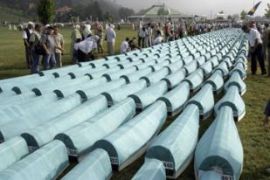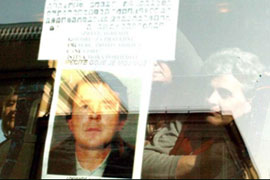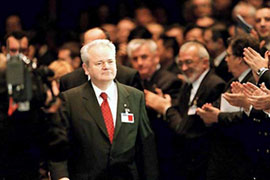UN court to rule on Bosnia genocide
World Court set for landmark ruling on whether Serbia planned Bosnian genocide.

Published On 26 Feb 2007
|
“I’m holding my breath as though they are about to decide on my life” Munira Subasic |
It says the campaign amounted to genocide in an attempt to create a “Greater Serbia” during the 1992-1995 Bosnian war.
Milosevic died in 2006 just weeks before his trial in The Hague for war crimes was due to end.
Serbia says it cannot be held responsible for the actions of Serb paramilitary groups and that the war was a conflict among ethnic groups.
It also argues that there was no intent to destroy Bosnia’s Muslim population in whole or in part – a key element in genocide as defined in the 1948 Genocide Convention.
Massacre
 |
| Relatives of victims of the war are travelling to The Hague to hear the verdict [EPA] |
“I’m holding my breath as though they are about to decide on my life,” Munira Subasic, a Bosnian Muslim who runs an organisation of survivors of the 1995 Srebrenica massacre.
“I hope justice will be done, I hope for a guilty verdict,” she said.
At the end of the Bosnian war, Serb forces summarily killed some 8,000 Muslim men and boys over several days at Srebrenica.
Subasic, who lost 22 family members including her father, husband and son in the massacre, will travel to The Hague with 30 other survivors to attend the verdict hearing by the ICJ, the highest United Nations court.
“We want to show the world, which allowed the genocide to happen, that we are still alive and that we still expect justice and the truth,” she said.
The massacre – already classified as a genocidal act by the UN’s International Criminal Tribunal for the former Yugoslavia – is Europe’s worst atrocity since World War II.
In the case launched in 1993 by Bosnia’s then Muslim-dominated government, Sarajevo accuses Belgrade of backing the widespread “ethnic cleansing” of its people during the war.
Filed against the then Yugoslavia, whose two republics Serbia and Montenegro have since split, it is the first time a country has accused another state of genocide, the gravest of war crimes.
Reparation
 |
| Milosevic died whilst on trial in The Hague for war crimes [EPA/file] |
Lawyers acting for Bosnia have argued that Serbia be found guilty of genocide or, alternatively, aiding and abetting genocide committed by individuals, groups and entities.
Bosnia has also asked the court to award reparation payments from Serbia that could reportedly amount to billions of dollars.
The case has been one of the most divisive issues within Bosnia, which was split into two political entities – the Serbs’ Republika Srpska and the Muslim-Croat Federation – at the end of its 1992-95 war.
Bosnian Serbs, who account for about 30 per cent of the country’s 3.8 million population, have backed Belgrade in the case by denying it committed genocide and agression against the country.
They have never hid their desire for the failure of the action, which alleges that systematic “ethnic cleansing” of Muslims and Croats was supported by the regime of late Serbian president Slobodan Milosevic.
Unique
The case is unique because it covers the whole of the war in Bosnia.
The International Criminal Tribunal for the former Yugoslavia (ICTY), the UN’s ad hoc war crimes court, has handed down many verdicts relating to the Bosnian war, but they were limited to certain events or key people.
The only trial that tackled the whole of the Bosnian war and Serbia’s involvement was the unfinished case against Milosevic.
The 16-judge ICJ panel is expected to take several hours to read its verdict.
The court’s ruling is final with no appeal.
The prime minister of Bosnia’s Serb-run half, Milorad Dodik, said last week his government was not prepared to accept any verdict.
“Republika Srpska will not accept the verdict and will not implement it,” he said, calling the case illegal because the charges were filed during the war when Serbs were not a part of the government.
Source: News Agencies